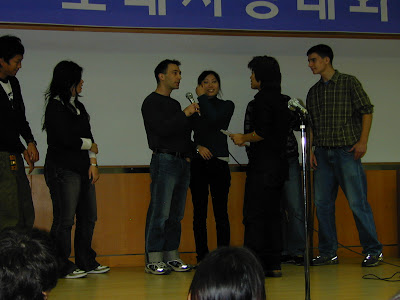Koreans do a lot of their singing at noraebang 노래방, which literally means "song room". In any part of Seoul where there is night life -- restaurants, theaters, bars -- there will be a high density of noraebang. The Shinchon area near where we live is full of them. Many young Koreans will make an evening of dinner, drinks, and an hour or two of singing.
A noraebang is a small, sound-proofed room with a karaoke machine in it. It is rented by the hour. There are thousands of songs available, all instrumental versions with the vocal parts missing. As the songs play, the lyrics appear on a video screen, often super-imposed over a montage of visual images that has nothing to do with the song. You can order soft drinks and snacks. So far I have yet to see alcoholic beverages at a noraebang. You'd think that would be a natural combination, so I wonder if it is illegal to serve alcohol at noraebang.
In China and Taiwan, the equivalent to noraebang is called "KTV" (which I believe derives from Karaoke TV).
At all the norebang I've been to so far, the volume has been set at an ear-splitting level and is not adjustable.
My first trip to a noraebang was on November 6, when my class was trying to pick a song to perform at the KLI singing contest. Fortunately Erma came along with us, because most of us were not familiar with how it worked. We were able to rent an extra-large room to accommodate all of us.
In this picture we are looking through the lists of songs to find ones to sing. The songs have unique numbers which are entered using a gigantic remote control. The songs then queue up and play in order. There is a pretty large selection of Japanese, Chinese, and Western songs along with the Korean songs, from different eras in a variety of styles.

Here's Erma singing a song she learned years ago on an earlier trip to Korea. The background video consisted of scenes of European landmarks.

After you sing, the computer will score your performance out of 100 points. As far as I can tell the scores are essentially random, but perhaps there is some sort of highly sophisticated pitch-matching algorithm in there.
Some noraebang will also let you make a CD or tape of your performance to keep. When we had narrowed our song choices down, Erma and I made a CD by renting a noraebang and playing the songs without singing along. The idea was that we could use the CD to practice and also on the day of the performance.
One of the songs we recorded was "Summer Dance" (you can see a video of it here), which actually has an animated video specifically designed for the song. I took a few pictures while it was recording.

This song, like many modern Korean pop songs, has some English in it.

One of the other songs we were considering is the most popular song in Korea right now, called "Tell Me" by the Wondeo Geolseu 원더 걸스 (that is, "Wonder Girls"). Not only is it played everywhere, it's become a touchstone cultural reference, and you can hardly turn on the TV without seeing someone doing the dance moves from the video or humming the chorus. If you're curious about what kind of Korean pop is prevalent nowadays, take a look/listen here.







